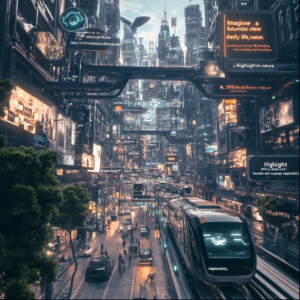
Leading Expert Critiques Myths Surrounding Superhuman AI
In the rapidly shifting landscape of technology, one buzzword that sends chills down the spines of many or ignites wild-eyed enthusiasm in others is that of superhuman AI, or what the tech-savvy sometimes call Artificial General Intelligence (AGI). This particular topic has sparked not just conversations, but full-blown arguments that rival the best philosophical debates over a good cup of tea. There’s a meaty divide between those who believe AGI is just a hop, skip, and a jump away and those who think the concept resembles fantastical goblins dancing in a midnight forest—enticing but utterly disconnected from reality.
Take, for instance, Michael Jordan—a name that may conjure images of basketball, but in this case, it's tied to the esteemed mind of a computer science professor at the University of California, Berkeley. Dr. Jordan has taken a firm stand, recently speaking out at an AI conference in Paris where he dismissed the idea that AGI will swoop in to solve all of humanity’s woes as “nonsense.” And you can’t help but wonder, is it that simple, or is there something more substantial at play?
Jordan anchors his skepticism in the current limitations of AI technology. Sure, our chatty chatbots, fueled by hefty models like ChatGPT, can whip up answers quicker than you can say “supervised learning,” but that doesn’t mean they possess true intelligence. He likens today's AI models to a gaggle of mini-experts scattered haphazardly across various subjects—incredible at certain tasks but lacking the brainpower to stitch it all together into coherent human-like understanding. It makes you appreciate your own messy, wholly human thought process, doesn’t it?
But what really gets Jordan's goat is the tidal wave of funding pouring into the pursuit of superhuman AI. We’re talking billions—yes, billions!—being funneled into labs across the globe in a mad dash to birth what many might consider an illusory goal. Each dollar, he argues, directs resources away from more practical, pressing projects that could lead to tangible benefits right here and now. Imagine a world where instead of chasing phantoms, researchers worked on AI solutions for healthcare or traffic systems. Now that’s the stuff dreams are made of!
But hold on! Not everyone is donning the skeptics’ hat. On the other end of this fervent discussion is Carl Shulman, an independent AI researcher with affiliations that read like a who's who of futuristic think-tanks. Shulman sees a different horizon—one tinted with the colors of abundance and possibility. He posits that we’re on the brink of a world where intelligence isn’t just a precious commodity for the high-brow elite like a perfectly aged bottle of wine—it will be as plentiful as water from a fire hose, potentially upending traditional notions of employment and economics.
Think about it: in this brave new world, high-paying professions—management, legalities, and even medicine—could be undertaken by relentlessly efficient AI. No lunch breaks, no need for a degree, and no endless hours of study. The implications are staggering. As Shulman unfolds his vision, the trees of our economic models begin to shake, and we can almost feel the reverberation of job displacement echoing from the corridors of power down to the average worker bee.
And yet, amidst these translated utopian visions, lies the grim reality that we’re woefully unprepared for the tidal forces of change. Paul Roetzer, the brains behind the Marketing AI Institute, has raised a clarion call to the business and political leaders, urging them to plan and strategize with far greater seriousness. Because, let’s face it, if you blink, the workforce could be dramatically mismatched with the demands of our AI-driven future. A cocktail party of confusion awaits if they continue to ignore the lightning-fast evolutions taking shape in front of their very eyes.
Then there’s Elon Musk—oh, Elon. Always a headline grabber, Musk has donned the role of the tech doomsayer, warning that without stringent regulations, the race to create AGI could become a recipe for disaster. His belief is simple: unleash superintelligent AI into the wild without a leash, and the result could be catastrophic. His alarmist tones underscore the urgency for ethical considerations in AI development, a discussion that’s doggedly needed as more professionals in AI safety start to pull the plug on their associations with companies pushing the AGI agenda. The flight of these experts highlights a disconnect between ambition and responsibility—an unsettling prospect that should keep us all awake at night contemplating the safeguards we need in place.
The discourse around superhuman AI is as multifaceted as a well-cut diamond, revealing both dazzling brilliance and shadowy concerns. On one side, we have an array of voices predicting that AGI is just around the corner, ready to upend our way of life; on the other, cautious wisdom urging us to keep our feet firmly planted on the ground. There’s precedent here in human history; ambition has always danced dangerously close to folly.
As we meander through this labyrinth of promises and pitfalls, one thing is clear: it’s vital to maintain a balance between zealously pursuing these technological frontiers while being unwaveringly mindful of the ethical and societal waves that may ripple outward from any advances we make. Even if AGI is penned in as tomorrow’s revolutionary hero, the reality of AI's impact today isn’t going to wait around for our whims and fancies. Being prepared, knowledgeable, and astute is our best bet at navigating what lies ahead.
Want to stay up to date with the latest news on neural networks and automation? Subscribe to our Telegram channel: @channel_neirotoken
Engaging with this unfolding narrative will not only arm you with useful knowledge but also prepare you for the inevitable changes that artificial intelligence brings to the table.

